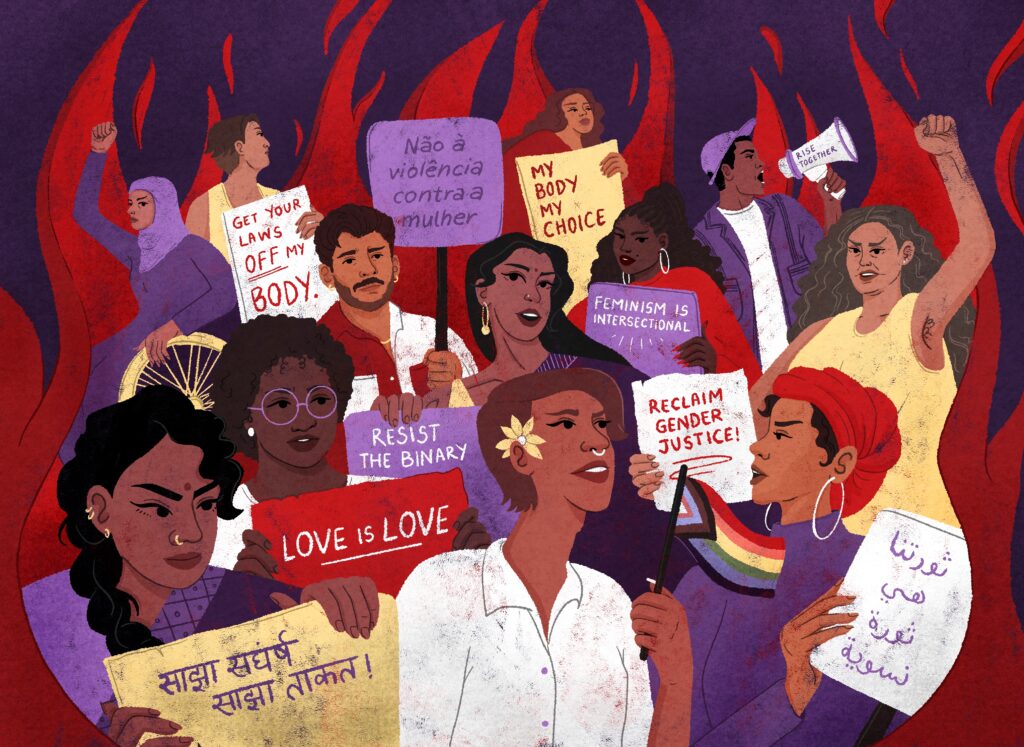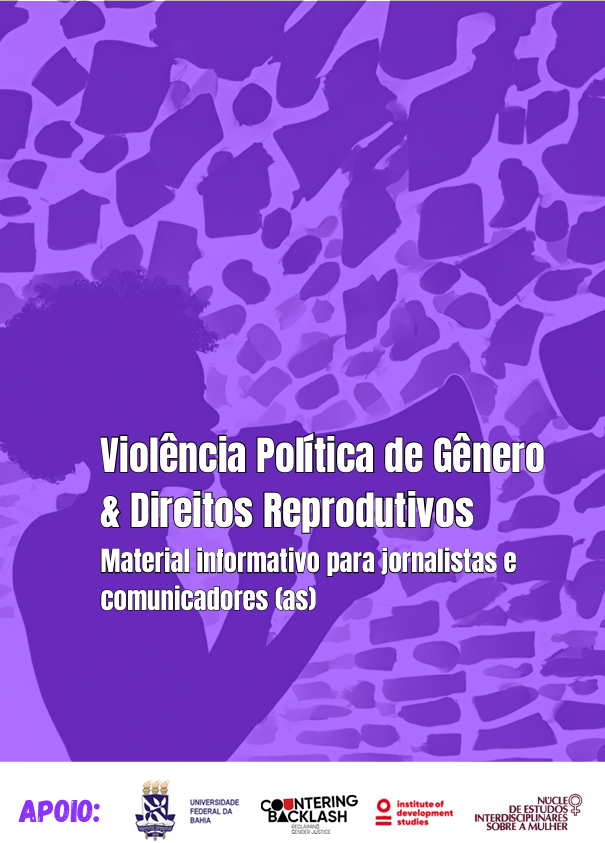This paper explores the dilemmas faced by gender justice activists in Bangladesh regarding whether and how to engage with laws that conflict with fundamental freedoms and rights, while acknowledging the importance of a legal framework to regulate cyberspace. […]
Cards Against Backlash
Our ‘Cards Against Backlash: Forwards to a Feminist Future – Strategies for Surviving and Countering Gender Backlash’ draws on real-life tactics from our programme but individuals and organisations have been anonymised to keep them safe. These inspiring strategies are based on our struggles. […]
Feminisms in Brazil: Confronting and Dismantling Backlash
This paper explores the research undertaken by the Nucleus of Interdisciplinary Studies on Women (NEIM), of the Federal University of Bahia (UFBA), Brazil, involving faculty and graduate and undergraduate students as part of the Countering Backlash programme. […]
Countering Backlash: Reclaiming Gender Justice in Uganda
This report engages with the following questions that have been explored over a period of four years: What is backlash? What is the origin, nature and motive of gender backlash? What drives gender backlash? […]
Analysis of Voice and Agency in Countering Backlash Against Gender Justice: Synthesis of Three Policy Cases in Bangladesh
This paper consolidates research conducted in Bangladesh on three policy cases to understand how gender justice movements formulate their demands on specific issues in response to the backlash they encounter from anti-rights actors. […]
Backlash and Beyond: Anti-LGBTQ Lawmaking and Existential Panic in Ghana, Kenya and Uganda
This paper is based on a discourse analysis of select anti-LGBTQ laws, draft laws and related parliamentary proceedings in 2023 in Ghana, Kenya and Uganda, and reveals how efforts at expanded criminalisation seek to further regulate, police and constrain sex, sexuality, gender, family, and African subjectivities and nationhood. […]
Violência Política de Gênero & Direitos Reprodutivos
O material informativo para jornalistas e comunicadores/as sobre Violência Política de Gênero e Direitos Reprodutivos. A cartilha é resultado do curso de extensão realizado no âmbito do projeto de pesquisa “Combatendo a ocorrência, reivindicando justiça de gênero”, do Núcleo de Estudos Interdisciplinares sobre a Mulher (NEIM/UFBA).
O material informativo busca contribuir para a cobertura de questões relacionadas à violência política de gênero e aos direitos reprodutivos, que nesta semana estão ameaçados pelo PL 1904, que equipara ao homicídio o aborto de gestação acima de 22 semanas. Mobilizações de mulheres e pessoas com útero ocuparam as ruas das principais cidades brasileiras para se contraporem ao PL.
Participaram da produção do material, estudantes reivindicando o BEGD que realizaram estágio no NEIM, no projeto Combatendo a ocorrência, fazendo justiça de gênero, sob supervisão da professora Dra. Maíra Kubik Mano.
Resource Pack: Online Safety For Activists
Resource Pack: Online Safety for Activists aims to share knowledge and learning about online gender-based violence (OGBV). It provides a comprehensive list of strategies and existing protection mechanisms to create safety for online activists and others. […]
Backlash in the Lebanese Media
This research report from the Arab Institute for Women explores the presence of backlash in Lebanese media, and how it is used. […]
Understanding Backlash in Lebanon
This research report from the Arab Institute for Women explores definitions of backlash, and how backlash should be understood in Lebanon. […]
Chess for Countering Backlash
This Chess – Shatranj or Chaturanga – workshop exercise can be played in various ways. You can play this as an exercise – or a series of exercises – in a workshop setting. You can also do it at home or at your desk, to aid thinking and research. […]
Anti-Gender Backlash: Where is Philanthropy?
This working paper explores how philanthropic institutions with a history of supporting women’s and LGBTQI+ rights and democracy are seeing and responding to anti-gender backlash, and the background dynamics shaping the struggle. […]
Understanding Gender Backlash: Southern Perspectives
The 30th anniversary of the Beijing Declaration and Platform for Action in 1995, and the 10th anniversary of the Sustainable Development Goals (SDGs), are fast approaching. And with global progress on gender justice being attacked around the world, we must find ways to combat gender backlash now.

The Countering Backlash programme has produced timely research and analysis on gender backlash, presenting a range of perspectives and emerging evidence on backlash against gender justice and equality, as such phenomena manifest locally, nationally, and internationally.
‘Understanding Gender Backlash: Southern Perspectives’ is our iteration of the IDS Bulletin, including contributions, insights, expert knowledge from a range of actors in diverse locations across South Asia, Sub-Saharan Africa, Brazil, Lebanon and the UK – and all part of the Countering Backlash programme.
The IDS Bulletin addresses the urgent question of how we can better understand the recent swell of anti-gender backlash across different regions, exploring different types of actors, interests, narratives, and tactics for backlash in different places, policy areas, and processes.
The IDS Bulletin will be launched by a hybrid event on 07 March 2024, ahead of the programme’s attendance at UN Women’s Commission on the Status of Women (CSW) 2024.
Articles
Jerker Edström; Jennifer Edwards; Chloe Skinner; Tessa Lewin; Sohela Nazneen
Institute of Development Studies (IDS)
Sohela Nazneen
Institute of Development Studies (IDS)
Cecília Sardenberg; Teresa Sacchet; Maíra Kubík Mano; Luire Campelo; Camila Daltro; Talita Melgaço Fernandes; Heloisa Bandeira;
Nucleus of Interdisciplinary Women’s Studies of the Federal University of Bahia (NEIM)
Maheen Sultan; Pragyna Mahpara
BRAC BIGD
Adeepto Intisar Ahmed; Ishrat Jahan; Israr Hasan; Sabina Faiz Rashid; Sharin Shajahan Naomi
BRAC James P Grant School of Public Health
Jerker Edström
Institute of Development Studies (IDS)
Abhijit Das; Jashodhara Dasgupta; Maitrayee Mukhopadhyay; Sana Contractor; Satish Kumar Singh
Centre for Health and Social Justice (CHSJ)
Shraddha Chigateri; Sudarsana Kundu
Gender at Work Consulting – India
Phil Erick Otieno; Alfred Makabira
Advocates for Social Change Kenya (ADSOCK)
Amon A. Mwiine; Josephine Ahikire
Centre for Basic Research
Tessa Lewin
Institute of Development Studies (IDS)
Nay El Rahi; Fatima Antar
Arab Institute for Women (AIW)
Jerker Edström, Jenny Edwards, Tessa Lewin, Rosie McGee, Sohela Nazneen, Chloe Skinner
Institute of Development Studies (IDS)
বাংলাদেশের পারিবারিক সহিংসতা আইন বাস্তবায়নে নেতিবাচক প্রতিক্রিয়া (ব্যাকল্যাশ) প্রতিরোধ
নারী ও শিশু নির্যাতন দমন আইন এবং পারিবারিক সহিংসতা (প্রতিরোধ ও সুরক্ষা) আইন ২০১০- এর মতো আইন থাকা সত্ত্বেও বাংলাদেশে পারিবারিক সহিংসতার হার অনেক বেশি। বাংলাদেশ পরিসংখ্যান ব্যুরোর তথ্য অনুযায়ী, প্রতি পাঁচজন নারীর মধ্যে প্রায় তিনজন (৫৭.৭%) তাদের জীবদ্দশায় কোনো না কোনো ধরনের শারীরিক, যৌন বা মানসিক সহিংসতার শিকার হয়েছেন। […]
Countering Backlash in the Implementation of Bangladesh’s Domestic Violence Act
Domestic violence rates are high in Bangladesh in spite of laws such as the Nari o Shishu Nirjatan Domon Ain and the DVPPA 2010. According to data from the Bangladesh Bureau of Statistics, almost three in every five women (57.7%) have experienced some form of physical, sexual, or emotional violence in their lifetime. […]
Anti-Gender Discourse in Serbian Media
This paper seeks to lay out a critical feminist analysis of anti-gender discourse in 843 media texts published in Serbia from January 1, 2019 to October 31, 2022. A database with the largest coverage of mainstream news was selected. […]
Patriarchal (Dis)orders: Backlash as Crisis Management
This article examines more global dynamics of backlash, exploring the question of why and how it has emerged with greater intensity in recent years, and how we can better understand it. […]
Reversing Domestic Workers’ Rights: Stories of Backlash and Resilience in Delhi
‘Reversing Domestic Workers’ Rights: Stories of Backlash and Resilience in Delhi’ is a timely and important new ‘storybook’ produced by Gender at Work Consulting – India. It shares 12 stories from domestic workers living in Delhi NCR, and the often-tragic tales of their lives. […]
Backlash in Action? Or Inaction? Stalled Implementation of the Domestic Violence (Prevention and Protection) Act 2010 in Bangladesh
This paper explores the lax implementation of the Domestic Violence Act, and how it is effecting gender backlash in Bangladesh. It also examines how women’s rights organisations have articulated feminist voices in terms of agenda and framing and used collective agency to counter the pushback. […]
Mothers vs Children: Co-opting Child Rights as Gender Backlash
This paper examines how progressive rights frameworks are used as gender backlash tools to suppress feminist activism. The author engages with the events following Rehana Fathima’s political act ‘Body and Politics’, which faced strong backlash in the form of censure through law, and discourse capture. […]
